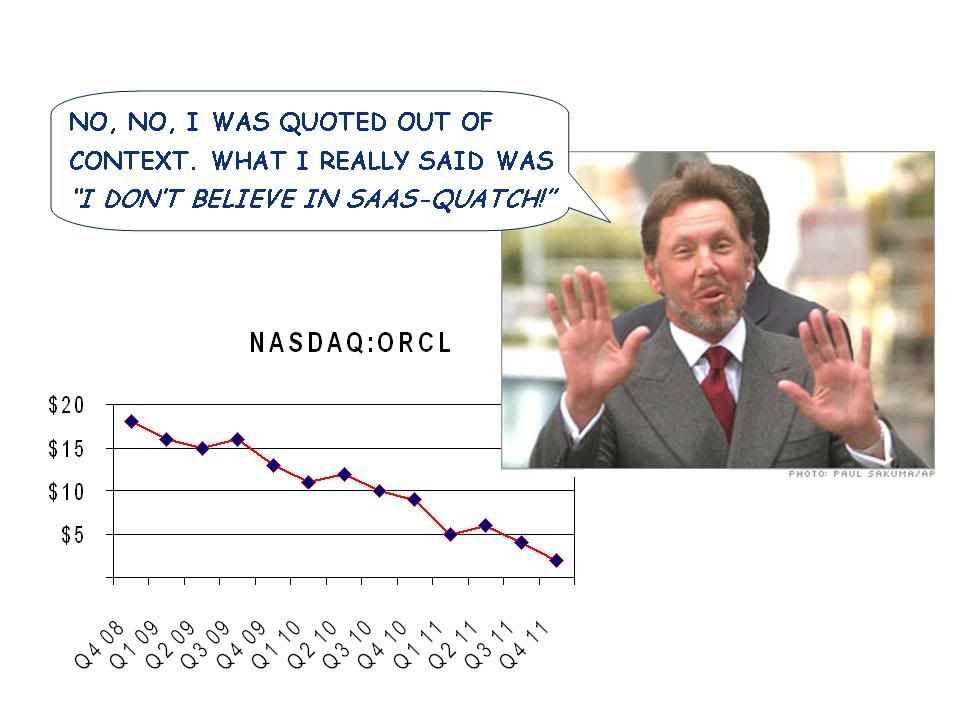
While everyone's who anyone was jumping on the bandwagon (sorry, Alyssa Milano), remember the one maverick blog that called it egregious hypocrisy from the start.... WhoHasTimeForThis?






 Click on the image to hear my son jamming at the Sonic Mule headquarters...
Click on the image to hear my son jamming at the Sonic Mule headquarters... Only one startup was crazy enough to try this. With some amusement, I watched Daniel Dreymann's team for three years trying to line up all these ducks. Suddenly, in September, I heard quacking. Mountain View-based Goodmail had actually signed up ISP's representing over 300 million users (including most of the consumer ISP inboxes in the US and Europe), deployed the necessary cryptographic infrastructure, and delivered over three billion CertifiedEmail messages that month on behalf of Time, StubHub and other commercial and non-profit senders.
Only one startup was crazy enough to try this. With some amusement, I watched Daniel Dreymann's team for three years trying to line up all these ducks. Suddenly, in September, I heard quacking. Mountain View-based Goodmail had actually signed up ISP's representing over 300 million users (including most of the consumer ISP inboxes in the US and Europe), deployed the necessary cryptographic infrastructure, and delivered over three billion CertifiedEmail messages that month on behalf of Time, StubHub and other commercial and non-profit senders. That's what I call an industry standard solution to a big problem. So last week I invested in Goodmail and joined the board, alongside Scott Kurnit, Don Hutchison, VCs from DCM, Emergence and Softbank, and GoodMail's new CEO Peter Horan (former CEO of About.com).
That's what I call an industry standard solution to a big problem. So last week I invested in Goodmail and joined the board, alongside Scott Kurnit, Don Hutchison, VCs from DCM, Emergence and Softbank, and GoodMail's new CEO Peter Horan (former CEO of About.com). Not every (any?) great software application comes from Redmond. Today more than ever individuals and small teams of programmers in every country of the world develop great applications that wither on the vine for lack of visibility and a business model. OpenCandy's technology promises revenue, cheap distribution and free analytics to programmers who may not have their own big marketing departments.
Not every (any?) great software application comes from Redmond. Today more than ever individuals and small teams of programmers in every country of the world develop great applications that wither on the vine for lack of visibility and a business model. OpenCandy's technology promises revenue, cheap distribution and free analytics to programmers who may not have their own big marketing departments.
 Having realized a 30X gain on my 1997 investment in Tumbleweed, I'm delighted to be incubating Jeff Smith's next venture, Sonic Mule. After taking Tumbleweed public, Jeff retreated to Stanford in pursuit of his doctorate in classical music; he then joined Bessemer as an EIR, where he conceived Sonic Mule (aka Smule). Jeff recruited Ge Wang (Stanford) and Perry Cook (Princeton) -- two of the world's the most prominent professors in computer-music integration and the inventors of Chuck, an open source language that processes and renders sound in real time.
Having realized a 30X gain on my 1997 investment in Tumbleweed, I'm delighted to be incubating Jeff Smith's next venture, Sonic Mule. After taking Tumbleweed public, Jeff retreated to Stanford in pursuit of his doctorate in classical music; he then joined Bessemer as an EIR, where he conceived Sonic Mule (aka Smule). Jeff recruited Ge Wang (Stanford) and Perry Cook (Princeton) -- two of the world's the most prominent professors in computer-music integration and the inventors of Chuck, an open source language that processes and renders sound in real time.
 When Tim Berners-Lee conceived the web, he dreamed of inter-connected documents, of surfing along from one person's page to the next, following a fluid path rich with information and discovery.
When Tim Berners-Lee conceived the web, he dreamed of inter-connected documents, of surfing along from one person's page to the next, following a fluid path rich with information and discovery. So 18 months ago my partner Justin Label and I started cooking up a startup to save the web. We conceived of a platform for creating and distributing mash-ups transparently and securely so that you can pick the news sources, e-commerce vendors, reference materials, social networks, media stores, etc. to which your web pages link. We even hoped to mash your web content with personalized objects (e.g. how closely are you LinkedIn to people you read about?), in-page media (e.g. streaming music) and fewer ads. We called it MashLogic.
So 18 months ago my partner Justin Label and I started cooking up a startup to save the web. We conceived of a platform for creating and distributing mash-ups transparently and securely so that you can pick the news sources, e-commerce vendors, reference materials, social networks, media stores, etc. to which your web pages link. We even hoped to mash your web content with personalized objects (e.g. how closely are you LinkedIn to people you read about?), in-page media (e.g. streaming music) and fewer ads. We called it MashLogic.


I spent the weekend at CalTech to attend a Skeptics Society conference. This particular event was titled “Origins: the Big Questions," addressing whether science renders divine faith obsolete. The speakers who drew me there were quantum physicist Leonard Susskind, entertainer Keith Dalton (creator and star of the hilarious and irreverent online series Mr. Deity), and of course Michael Shermer, who founded the society and edits the great Skeptic Magazine.
The Good Part 
The conference began with a real bang – the Big one of course, and a lesson on what preceded that singularity as best understood today by physicists. Susskind condensed his Stanford undergraduate cosmology course into a beautiful one-hour primer on the universal constants (Planck’s, gravitational constant, speed of light…) that support life. It turns out that life can only evolve and survive in a narrow window of values for these constants, a fact that Christians have recently embraced as proof of an intelligent designer. But Susskind explained how quantum mechanics support the existence of a multiverse that regularly spawns new universes with different sets of constants, making it inevitable that our comfy universe should appear. (I asked him whether a future day Dr. Strangelove could create the conditions that spawn a new universe in our own – he said no, but without a compelling explanation.)
 The other highlight of the day was Dr. Donald Prothero, who summarized his undergraduate Caltech course on evolution. Prothero first debunked the Christian claims that there are evidentiary gaps in the theories of early evolution on Earth. He walked us through the Fox-Miller-Urey experiments conducted in the 1970’s in which amino acids formed in a simulation of the primordial soup, and identified exactly which elements on earth would have catalyzed the binding of those molecules into proteins and nucleic acids (most likely RNA). He showed us photographs of three billion year old fossils in which these nucleic acids are evident. He then shared
The other highlight of the day was Dr. Donald Prothero, who summarized his undergraduate Caltech course on evolution. Prothero first debunked the Christian claims that there are evidentiary gaps in the theories of early evolution on Earth. He walked us through the Fox-Miller-Urey experiments conducted in the 1970’s in which amino acids formed in a simulation of the primordial soup, and identified exactly which elements on earth would have catalyzed the binding of those molecules into proteins and nucleic acids (most likely RNA). He showed us photographs of three billion year old fossils in which these nucleic acids are evident. He then shared
Then he debunked the Christian claim that most modern species appeared “all at once” during the period known as the Cambrian explosion half a billion years ago (hmm, I thought the Lord had dispatched Noah only four thousand years ago). The Cambrian explosion is a dramatic misnomer, referring to a period of above average mutations that actually lasted over 20 million years.
The Bad Part
 The lowlight of the day was surely the talk by theologian Dr. Nancey Murphy, and the debate that followed between her and Michael Shermer. Apparently she got her current position because she sat in her “prayer chair” and specifically told her god what kind of position she wanted. It’s very important, she counsels, to be specific with Jesus (after all he’s pretty busy).
The lowlight of the day was surely the talk by theologian Dr. Nancey Murphy, and the debate that followed between her and Michael Shermer. Apparently she got her current position because she sat in her “prayer chair” and specifically told her god what kind of position she wanted. It’s very important, she counsels, to be specific with Jesus (after all he’s pretty busy).
The conference picked up at the end, when the cast of Mr. Deity -- directed by former Mormon Keith Dalton -- performed live episodes of the brilliant online series that really nails the Big Questions (with no input from the Templeton Foundation). If you haven’t watched it, start with Episode 1…
 Last weekend I took my boys to Hiller Aviation Museum, which hosted a demonstration of an actual jetpack at work. I had thought this was the stuff of science fiction, but this dude actually lifted off , flew down the runway a bit, hovered, returned, and landed. Cool!
Last weekend I took my boys to Hiller Aviation Museum, which hosted a demonstration of an actual jetpack at work. I had thought this was the stuff of science fiction, but this dude actually lifted off , flew down the runway a bit, hovered, returned, and landed. Cool! Before taking off, he did have to get clearance for his flight plan. As you can see from the vantage of my photo to the left, we stood right near the liftoff point--I was surprised that there was no smoky plume from the rocket fuel, but the noise at ignition was painfully impressive. The operator has to be quite strong to carry the device on his back, and even so he's limited to 30 seconds of rocket fuel.
Before taking off, he did have to get clearance for his flight plan. As you can see from the vantage of my photo to the left, we stood right near the liftoff point--I was surprised that there was no smoky plume from the rocket fuel, but the noise at ignition was painfully impressive. The operator has to be quite strong to carry the device on his back, and even so he's limited to 30 seconds of rocket fuel. Neverthleless, as the central theme of her energy plan Sarah Palin is now pushing the jetpack as a replacement for automobiles, which "burn all that smelly gasoline." Fortunately, the jetpack I saw burns hydrogen peroxide, which she seems to have in good supply.
Neverthleless, as the central theme of her energy plan Sarah Palin is now pushing the jetpack as a replacement for automobiles, which "burn all that smelly gasoline." Fortunately, the jetpack I saw burns hydrogen peroxide, which she seems to have in good supply.
 Why did McCain select a VP candidate from the state with the fewest electoral votes? Because Sarah Palin is just the religious fanatic he needs to mobilize the Republican vote. Palin, potentially one step away from the Presidency, rejects science at every turn. She would teach creationism in schools, appoint judges who federally outlaw abortion ("even if my own daughter was raped" [sic]), and reject policies that "assume" pollution causes global warming. McCain found the one governor even more Christian than George Bush! Oh, and she won a beauty pageant.
Why did McCain select a VP candidate from the state with the fewest electoral votes? Because Sarah Palin is just the religious fanatic he needs to mobilize the Republican vote. Palin, potentially one step away from the Presidency, rejects science at every turn. She would teach creationism in schools, appoint judges who federally outlaw abortion ("even if my own daughter was raped" [sic]), and reject policies that "assume" pollution causes global warming. McCain found the one governor even more Christian than George Bush! Oh, and she won a beauty pageant. Louisiana and Texas are currently debating legislation to join the states that teach ID in public schools. If this trend worries you, mark your calendar for Sept 20 from 11am to noon. Cal State science professor Larry Lerner will lecture on "The Creationist Chameleon: Past, Present, and Maybe a Bit of the Future" at the Lucie Stern Community Center, 1305 Middlefield Road in Palo Alto.
Louisiana and Texas are currently debating legislation to join the states that teach ID in public schools. If this trend worries you, mark your calendar for Sept 20 from 11am to noon. Cal State science professor Larry Lerner will lecture on "The Creationist Chameleon: Past, Present, and Maybe a Bit of the Future" at the Lucie Stern Community Center, 1305 Middlefield Road in Palo Alto. As you probably read about in news coverage of the recent Black Hat conference, Dan Kaminsky brilliantly discovered a catstrophic vulnerability in the internet's Domain Name System (DNS). The vulnerability permits a hacker to "poison the cache" of DNS servers with incorrect IP addresses -- a phisher's dream come true. Even better for hackers, the vulnerability allows them to intercept email traffic so that they can collect our passwords simply by asking the bank's login screen to email forgotten passwords. They can fool Certificate Authorities into issuing them valid SSL certificates so they can spoof your bank with compelling authority. And lots of other nasties, too.
As you probably read about in news coverage of the recent Black Hat conference, Dan Kaminsky brilliantly discovered a catstrophic vulnerability in the internet's Domain Name System (DNS). The vulnerability permits a hacker to "poison the cache" of DNS servers with incorrect IP addresses -- a phisher's dream come true. Even better for hackers, the vulnerability allows them to intercept email traffic so that they can collect our passwords simply by asking the bank's login screen to email forgotten passwords. They can fool Certificate Authorities into issuing them valid SSL certificates so they can spoof your bank with compelling authority. And lots of other nasties, too.
 Jay Batson said...
Jay Batson said...




 Needham Times
Needham Times
 But early adopters can experience the new Mozilla code base now by trying out Flock 2.0, released in Beta1 today to great reviews. Flock needs a new trophy shelf, having recently added a Webby and the #6 slot on PC World's top 100 Products for 2008. (Also would have won a WhoHas if not disqualified by my vested interest!)
But early adopters can experience the new Mozilla code base now by trying out Flock 2.0, released in Beta1 today to great reviews. Flock needs a new trophy shelf, having recently added a Webby and the #6 slot on PC World's top 100 Products for 2008. (Also would have won a WhoHas if not disqualified by my vested interest!) The Panasonic PtAE2000U Projector blasts out 1500 lumens of 1080P magic, with a contrast ratio of 15,000:1. Not only is it 40%+ brighter than any other 1080P projector on the market, but with most new HDMI projectors priced at or above $10,000, the Panasonic's $2,500 price tag is frankly suspicious. (Did these beauties "fall off a truck" on the way from the SONY plant?) Since I replaced my old Runco with this projector, my neighbors have been camping out in my basement.
The Panasonic PtAE2000U Projector blasts out 1500 lumens of 1080P magic, with a contrast ratio of 15,000:1. Not only is it 40%+ brighter than any other 1080P projector on the market, but with most new HDMI projectors priced at or above $10,000, the Panasonic's $2,500 price tag is frankly suspicious. (Did these beauties "fall off a truck" on the way from the SONY plant?) Since I replaced my old Runco with this projector, my neighbors have been camping out in my basement.



 for Best Fashion Product
for Best Fashion Product don't wake up tired.
don't wake up tired.

